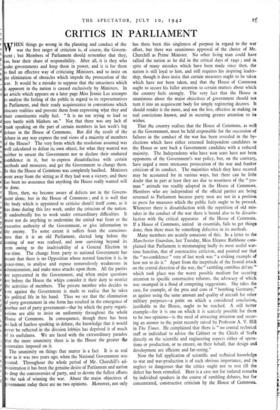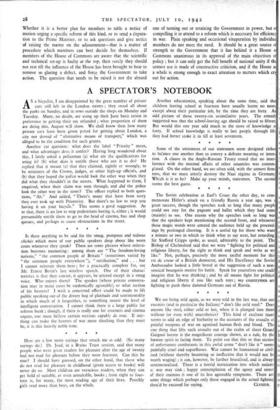CRITICS IN PARLIAMENT
e HEN things go wrong in the planning and conduct of the • war the first target of criticism is, of course, the Govern- ent ; but Members of Parliament should remember that they, oo, bear their share of responsibility. After all, it is they who ake governments and keep them in power, and it is for them h o find an effective way of criticising Ministers, and to insist on he elimination of obstacles which impede the prosecution of the ar. It would be a mistake to suppose that the uneasiness which s s apparent in the nation is caused exclusively by Ministers. In n article which appears on a later page Miss Jennie Lee attempts o analyse the feeling of the public in regard to its representatives n Parliament, and their ready acquiescence in conventions which bscure realities and prevent them from expressing what they and x eir constituents really feel. " It is no use trying to lead us d nto battle with blinkers on." Not that there was any lack of e rank speaking on the part of certain members in last week's big ebate in the House of Commons. But did the result of the ebate in any way express the real views of a majority of members f the House? The very form which the resolution assumed was ell calculated to defeat its own object, for what they wanted was either to unseat the Government nor to declare their unabated onfidence in it, but to express dissatisfaction with certain ethods and measures, and get the Government to change them. this the House of Commons was completely baulked. Ministers ent away from the sitting as if they had won a victory, and there s been no assurance that anything the House really wanted will done.
• Here, then, we become aware of defects not in the Govern- ent alone, but in the House of Commons ; and it is well that he body which is appointed to criticise should itself come, as it as done during this km week, under the criticism of the nation. t undoubtedly has to work under extraordinary difficulties. It ust not do anything to undermine the united war front or the xecutive authority of the Government, or give information to e enemy. To some extent it suffers from the conscious- • ess that it is an old Parliament, elected long before the d oming of war was realised, and now surviving beyond its erm owing to the inadvisability of a General Election in ar-time. The change from party to national Government has cant that there is no Opposition whose normal function it is, in a •eace-time, to analyse and expose remorselessly weaknesses in e dministration, and make mass attacks upon them. All the parties • re represented in the Government, and when major questions o re before the House the whips consider it their duty to restrict e he activities of members. The private member who decides to ote against the Government is made to realise that he takes is political life in his hand. Thus we see that the elimination f party government in one form has resulted in the emergence of nother sort of party government—that by which the party organi- tions are able to insist on uniformity throughout the whole ouse of Commons. In consequence, though there has been o lack of fearless speaking in debate, the knowledge that it would ever be reflected in the division lobbies has deprived it of much f its usefulness. We are faced with the extraordinary paradox ; hat the more unanimity there is in the House the greater the onstraints imposed on it.
The unanimity on things that matter is a fact. It is as real ow as it was two years ago, when the National Government was mated. Throughout the whole period of Mr. Churchill's ad- inistration it has been the genuine desire of Parliament and nation o drop the controversies of party, and to devote the fullest efforts o the task of winning the war. About the major objectives of overnment today there are no two opinions. Moreover, not only. has there been this singleness of purpose in regard to the war effort, but there was unanimous approval of the choice of Mr. Churchill as Prime Minister. No other living man could have rallied the nation as he did in the critical days of 194o ; and in spite of many mistakes which have been made since then, the nation is still loyal to him, and still requires his inspiring leader- ship, though it does insist that certain measures ought to be taken which have not been taken, and that the House of Commons ought to secure his fuller attention to certain matters about which the country feels strongly. The very fact that the House is unanimous about the major objectives of government should not turn it into an acquiescent body for simply registering decrees. It should render it the more, and not the less, effective in making its real convictions known, and in securing greater attention to its wishes.
That the country realises that the House of Commons, as well as the Government, must be held responsible for the succession of failures in the conduct of the war has been revealed in the by- elections which have either returned Independent candidates to the House or sent back a Government candidate with a reduced majority. The Independents who have won seats have not been opponents of the Government's war policy, but, on the contrary, have urged a more strenuous prosecution of the war and franker criticism of its conduct. The majorities which they have secured may be accounted for in various ways, but there can be little doubt that in part at least they are due to weariness of the " yes- man " attitude too readily adopted in the House of Commons. Members who are independent of the official parties are being returned to Parliament because party men are not in a position to press for measures which the public feels ought to be pressed. Whenever there is dissatisfaction with the repetition of old mis- takes in the conduct of the war there is bound also to be dissatis- faction with the critical apparatus of the House of Commons. If a House of Commons, united in essentials, fails to get things done, then there must be something defective in its methods.
Many members are acutely conscious of this. In a letter to the Manchester Guardian, last Tuesday, Miss Eleanor Rathbone com- plained that Parliament is mismanaging badly its most useful war- time function, that of constructive criticism, and pointed out that the " no-confidence " vote of last week was " a striking example of how not to do it." Apart from the ineptitude of the frontal attack on the central direction of the war, the " rambling omnibus debate " which took place was the worst possible medium for securing attention to specific constructive reforms, the advocacy of which was swamped in a flood of competing suggestions. She takes the case, for example, of the pros and cons of " bombing Germany," as against using the same amount and quality of aircraft for other military purposes—a point on which a considered conclusion, justifiable to the House, ought to be reached. A still better example—for it is one on which it is scarcely possible for there to be two opinions—is the need of attracting attention and secur- ing an answer to the point recently raised by Professor A. V. Hill in The Times. He complained that there is " no central technical staff or individual to advise the Cabinet or the Chiefs of Staffs directly on the scientific and engineering aspects either of opera- tions or production, or to ensure, on their behalf, that design and development are efficient and far-seeing."
Now the full application of scientific and technical knowledge to war and war-production is of such obvious importance, and its neglect so dangerous that the critics ought not to rest till the defect has been remedied. Here is a case not for isolated remarks by individual speakers in the course of rambling debates, but for concentrated, constructive criticism by the House of Commons. Whether it is a better plan for members to table a notice of motion urging a specific reform of this kind, or to send a deputa- tion to the Prime Minister, or to ask questions and give notice of raising the matter on the adjournment—that is a matter of procedure which members can best decide for themselves. If members of the House of Commons are aware that the scientific and technical set-up is faulty at the top, then surely they should not rest till the influence of the House has been brought to bear to remove so glaring a defect, and force the Government to take action. The question that needs to be raised is not the absurd one of turning out or retaining the Government in power, but compelling it to attend to a reform which is necessary for efficienc in war. Plain speaking and occasional vituperation by individua members do not meet the need. It should be a great source strength to the Government that it has behind it a House Commons unanimous in its approval of the main objectives policy ; but it can only get the full benefit of national unity if the utmost use is made of constructive criticism, and if the House a whole is strong enough to exact attention to matters which out for action.



























 Previous page
Previous page